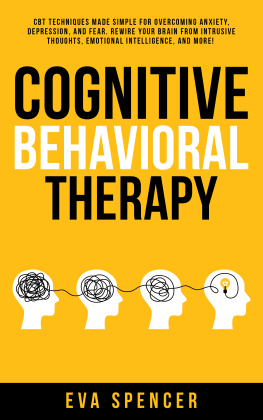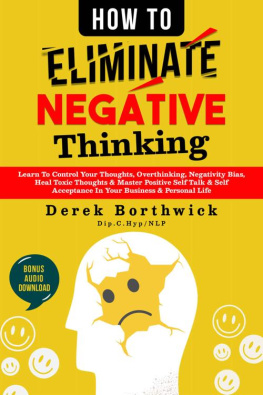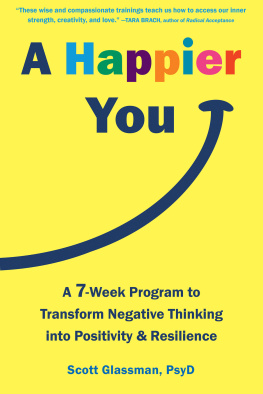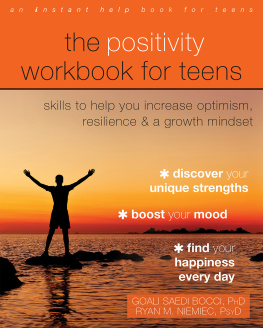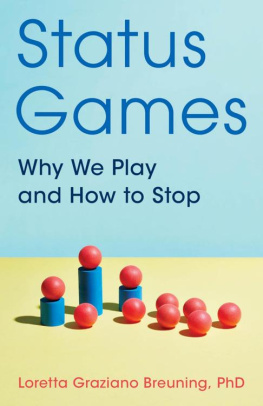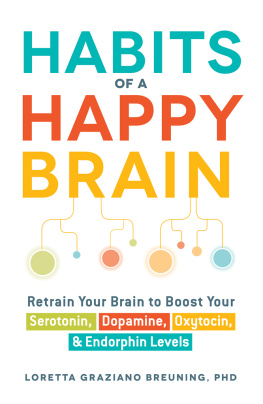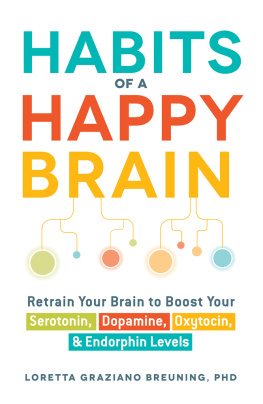The Science of Positivity
Stop Negative Thought Patterns by Changing Your Brain Chemistry
Loretta Graziano Breuning, PhD, author of Habits of a Happy Brain

Avon, Massachusetts
Copyright 2017 by Loretta Graziano Breuning.
All rights reserved.
This book, or parts thereof, may not be reproduced in any form without permission from the publisher; exceptions are made for brief excerpts used in published reviews.
Published by
Adams Media, an imprint of Simon & Schuster, Inc.
57 Littlefield Street, Avon, MA 02322. U.S.A.
www.adamsmedia.com
ISBN 10: 1-4405-9965-3
ISBN 13: 978-1-4405-9965-1
eISBN 10: 1-4405-9966-1
eISBN 13: 978-1-4405-9966-8
Library of Congress Cataloging-in-Publication Data
Breuning, Loretta Graziano, author.
The science of positivity / Loretta Graziano Breuning, PhD.
Avon, Massachusetts: Adams Media, 2017.
Includes bibliographical references and index.
LCCN 2016026201 (print) | LCCN 2016038599 (ebook) | ISBN 9781440599651 (pb) | ISBN 1440599653 (pb) | ISBN 9781440599668 (ebook) | ISBN 1440599661 (ebook)
LCSH: Positive psychology. | Attitude (Psychology)
LCC BF204.6 .B74 2016 (print) | LCC BF204.6 (ebook) | DDC 158.1--dc23
LC record available at https://lccn.loc.gov/2016026201
This book is intended as general information only, and should not be used to diagnose or treat any health condition. In light of the complex, individual, and specific nature of health problems, this book is not intended to replace professional medical advice. The ideas, procedures, and suggestions in this book are intended to supplement, not replace, the advice of a trained medical professional. Consult your physician before adopting any of the suggestions in this book, as well as about any condition that may require diagnosis or medical attention. The author and publisher disclaim any liability arising directly or indirectly from the use of this book.
Cover design by Stephanie Hannus.
Cover image Yulia Glam/123RF.
For my children, Lauren and Kyle, who helped me learn about the brain from the bottom up.
Introduction
Anyone can feel positive. Anyone can enjoy the happy brain chemicals that positivity unleashes.
That may seem foolish because the bad in the world is so obvious. Negativity may seem like an intelligent response to the world around you. But when you know how your brain creates that response, you have the power to create a new one.
We have inherited a brain thats inclined to go negative. Its not that we want to feel badon the contrary, our brain evolved to seek good feelings. We go negative because our brain expects negativity to feel good. This paradox makes sense when you know the operating system weve inherited from our animal ancestors. All mammals have the same brain chemicals controlled by the same basic brain structures. Your mammal brain rewards you with good feelings when you do things that promote your survival. But your brain defines survival in a quirky way. This is why we end up with patterns that feel bad in our quest to feel good.
You can transcend your natural mammalian negativity. You can train your brain to go positive. This book shows how to rewire yourself for positivity in six weeks, in just three minutes a day. Positivity does not mean ignoring the realities of life. It means adjusting for the brains natural tendency to ignore the positives of life. Whether youre frustrated by your own negativity or the negativity of others, The Science of Positivity can help.
First, well explore the negative and positive chemicals that control your brain. Then youll learn how to PARE negativity with Personal Agency and Realistic Expectations. You can build a positive thought habit that lets in all the good that your inner mammal overlooked.
You may find it hard to believe that there are good things youve missed. Its easy to think your internal responses are caused by external facts because that is what the verbal part of your brain says. But your mammal brain does not process language so your two brains are literally not on speaking terms. Your internal responses rest on neural pathways paved by your early neurochemical ups and downs. The electricity in your brain flows into those old pathways unless you carve new ones. This book shows you how to build new pathways and give your electricity a new place to flow!
Chapter 1
Why Your Brain Goes Negative
Negativity feels good to your old circuits, but you can build new, positive circuits.
Do you get a bad feeling when you look at the world around you? Are you surrounded by people who only seem to focus on whats wrong? Do you wish you could enjoy more positive responses but fear that may be unwise or impossible?
Your response to the world is a learned habit. Our habits are hard to notice because theyre just physical pathways in the brain. These pathways channel electricity from your information inputs to your positive or negative brain chemicals. Your pathways were built from your unique life experience. The positive and negative experiences of your past paved neural pathways that channel your electricity today.
Negative thought patterns do not mean something is wrong with you. Negativity is natural. The science of positivity shows you why your mammal brain tends to go negative unless you build in a simple adjustment. This book will not tell you what to feel positive aboutthats for you to decidebut it will explain how your old pathways got there and how you can build new ones. Anyone can do it!
In this chapter, youll meet the inner mammal whose ups and downs are explained in depth later on in the book.
Observing Your Lens on Life
You may be thinking, the bad things I see are quite real. But this simple anecdote shows how easily our brain goes negative: Dog poop was a common sidewalk hazard when I was young. It was normal to let your pet mess in public and we couldnt imagine a world in which people routinely cleaned up after their pets. Today, most streets are gloriously free of dog poop. Did that make anyone happy? Not a bit. We rage at the occasional oops instead of noticing the enormity of the accomplishment. Wailing over one jerk who fouls the sidewalk seems more normal than celebrating the myriad sanitary successes. This normal thought habit does not leave you with a more accurate view of the world. It just leaves you feeling, well, shitty.
You may think anger was necessary to create that change. You may think negativity gives you power. But negativity is often just a habit. Historical perspective helps us see that, so heres a great example. In 1896, the London Spectator reported that society would be ruined by the invention of the bicycle. According to the agonizers of the day, the bicycle would end serious conversation by freeing people to flit in and out of more distant social groups instead of lingering for long talks with one group. Meaningful conversation would also be destroyed by the early bedtimes that extra exercise would provoke, it was reported. Behold the human brain at work, busily searching for negatives. You may think you would not have bought into such old rubbish, but you may be buying into new rubbish.
Most people pride themselves on their keen sense of the worlds flaws, so its hard to think of your indictments as a neural network that can simply be replaced. But you see things differently when you understand the operating system weve inherited from our animal ancestors. The brain chemicals that make us feel good (such as dopamine, serotonin, oxytocin, and endorphin) are inherited from earlier mammals. They motivate a mammal to promote its own survival by rewarding survival behaviors with a good feeling. When you know how your happy chemicals work in the state of nature, negativity makes sense. Before we explore that, lets define negativity.


